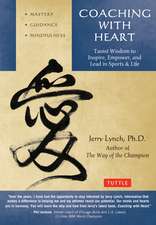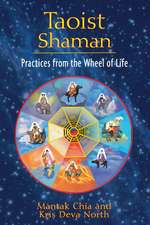The Dao of Translation: An East-West Dialogue: Routledge Advances in Translation and Interpreting Studies
Autor Douglas Robinsonen Limba Engleză Paperback – 27 sep 2018
The Dao of Translation will interest linguists and translation scholars. This book will also engage researchers of ancient Chinese philosophy and provide Western scholars with a thought-provoking cross-examination of Eastern and Western perspectives.
| Toate formatele și edițiile | Preț | Express |
|---|---|---|
| Paperback (1) | 396.29 lei 43-57 zile | |
| Taylor & Francis – 27 sep 2018 | 396.29 lei 43-57 zile | |
| Hardback (1) | 1165.20 lei 43-57 zile | |
| Taylor & Francis – 23 iun 2015 | 1165.20 lei 43-57 zile |
Din seria Routledge Advances in Translation and Interpreting Studies
-
 Preț: 302.37 lei
Preț: 302.37 lei - 9%
 Preț: 934.31 lei
Preț: 934.31 lei -
 Preț: 370.84 lei
Preț: 370.84 lei -
 Preț: 312.86 lei
Preț: 312.86 lei -
 Preț: 309.70 lei
Preț: 309.70 lei -
 Preț: 310.43 lei
Preț: 310.43 lei - 9%
 Preț: 934.04 lei
Preț: 934.04 lei -
 Preț: 311.76 lei
Preț: 311.76 lei -
 Preț: 385.36 lei
Preț: 385.36 lei -
 Preț: 341.63 lei
Preț: 341.63 lei -
 Preț: 333.22 lei
Preț: 333.22 lei -
 Preț: 311.41 lei
Preț: 311.41 lei -
 Preț: 311.22 lei
Preț: 311.22 lei -
 Preț: 384.75 lei
Preț: 384.75 lei -
 Preț: 310.25 lei
Preț: 310.25 lei -
 Preț: 640.26 lei
Preț: 640.26 lei -
 Preț: 469.34 lei
Preț: 469.34 lei - 12%
 Preț: 312.43 lei
Preț: 312.43 lei - 31%
 Preț: 762.97 lei
Preț: 762.97 lei - 26%
 Preț: 764.20 lei
Preț: 764.20 lei - 18%
 Preț: 1054.75 lei
Preț: 1054.75 lei - 18%
 Preț: 1059.00 lei
Preț: 1059.00 lei - 18%
 Preț: 1057.89 lei
Preț: 1057.89 lei - 12%
 Preț: 325.34 lei
Preț: 325.34 lei - 18%
 Preț: 1024.52 lei
Preț: 1024.52 lei -
 Preț: 449.41 lei
Preț: 449.41 lei - 18%
 Preț: 1109.99 lei
Preț: 1109.99 lei -
 Preț: 388.64 lei
Preț: 388.64 lei - 18%
 Preț: 1054.10 lei
Preț: 1054.10 lei - 26%
 Preț: 764.20 lei
Preț: 764.20 lei - 18%
 Preț: 998.71 lei
Preț: 998.71 lei - 18%
 Preț: 1000.27 lei
Preț: 1000.27 lei - 18%
 Preț: 1545.00 lei
Preț: 1545.00 lei -
 Preț: 431.18 lei
Preț: 431.18 lei - 13%
 Preț: 297.99 lei
Preț: 297.99 lei -
 Preț: 386.63 lei
Preț: 386.63 lei - 18%
 Preț: 1019.30 lei
Preț: 1019.30 lei - 25%
 Preț: 775.30 lei
Preț: 775.30 lei -
 Preț: 480.06 lei
Preț: 480.06 lei - 18%
 Preț: 1165.20 lei
Preț: 1165.20 lei - 18%
 Preț: 1108.37 lei
Preț: 1108.37 lei - 31%
 Preț: 764.20 lei
Preț: 764.20 lei - 26%
 Preț: 764.20 lei
Preț: 764.20 lei - 26%
 Preț: 764.20 lei
Preț: 764.20 lei
Preț: 396.29 lei
Nou
Puncte Express: 594
Preț estimativ în valută:
75.84€ • 78.89$ • 62.61£
75.84€ • 78.89$ • 62.61£
Carte tipărită la comandă
Livrare economică 14-28 aprilie
Preluare comenzi: 021 569.72.76
Specificații
ISBN-13: 9780367133801
ISBN-10: 0367133806
Pagini: 256
Ilustrații: 3 Tables, black and white; 2 Illustrations, black and white
Dimensiuni: 156 x 234 mm
Greutate: 0.45 kg
Ediția:1
Editura: Taylor & Francis
Colecția Routledge
Seria Routledge Advances in Translation and Interpreting Studies
Locul publicării:Oxford, United Kingdom
ISBN-10: 0367133806
Pagini: 256
Ilustrații: 3 Tables, black and white; 2 Illustrations, black and white
Dimensiuni: 156 x 234 mm
Greutate: 0.45 kg
Ediția:1
Editura: Taylor & Francis
Colecția Routledge
Seria Routledge Advances in Translation and Interpreting Studies
Locul publicării:Oxford, United Kingdom
Public țintă
Postgraduate and ProfessionalCuprins
1. Laozi’s Unspeakable Dao 2. The Dao of Abduction: Hartama-Heinonen on Peirce on Translation 2.1 Peirce and his Followers among Semiotic Translation Scholars 2.2 Hartama-Heinonen vs. Robinson 2.3 Exclusive Abduction 2.3.1 Translation as 無爲wuwei 2.3.2 + Reasoning 2.3.3 Foreclosing on Secondness and Thirdness 2.4 Guessing as Divining: Peirce on the Mystery 3. The Dao of Empathy: Mengzi’s Social Ecologies of Feeling 3.1 On Reading with Empathy 3.2 Mengzi’s Ecological Dao 3.3 Habit in Laozi 3.4 Mengzi on Inclinations and Disposition as Habit 3.5 Mengzi on禮 li 3.6 Mengzi on 仁ren: Translation as Transfeeling 3.7 The Chinese Roots of Romantic/Idealist Thought 3.8 Conclusion: "Chinese" Peirce and Saussure? 4. The Dao of Habit: Peirce (and Hartama-Heinonen) on the Tensions between Habit and Surprise 4.1 Peirce on Habit 4.2 Hartama-Heinonen on Habit 4.3 Creativity in the 中庸 Zhongyong 4.4 Conclusion 5. The Dao of the "Potential for Rules": Saussure on the Structuring Force in/of Language 5.1 Linguistic Entities Have No Objective Existence 5.2 Linguitic Entities are Human Constructs 5.3 Confusions Between the Language System and its Evolution 5.4 The Chaos of the "Potential for Rules" 5.5 Linguistic Entities and Social Values 5.6 Language is Social 5.7 The Intergenerational Transmission of a Preconscious Intensity of Experiential Thought 5.8 A Somatics of Language 5.9 Linguistic Habits and Socioaffective Ecologies 5.10 Translation as Dao 6. The Dao of Habitus 1: Bourdieu (and Damasio) on Body Automatisms 6.1 Socio-ecological Stabilizations of Words 6.2 Habit 6.3 The Collective Organization of Habit 6.4 Habitus 6.5 The "Habitual" Openness of the Social Field 6.6 Somatic Markers 1: Habitus Minus Self 6.7 Somatic Markers 2: Reason Minus Habitus 6.8 Somatic Markers 3: Habitus as a Preparatory Component of Reason 6.9 The Habitus and the Field 6.10 The Affective Transmission of Habitus 7. The Dao of Habitus 2: Simeoni on the Submissive Translator 7.1 Precipitation and Propensity 7.2 Somatic Habituses 7.3 Who is Suited to be a Translator? 7.4 The Submissive Translator 8. Conclusion: D(a)oing Translation
Recenzii
This book is a genuine contribution to translation studies in an age of interdisciplinarity and multiculturalism. … it introduces insightful ideas from semiotics, ancient Chinese philosophy, neuroscience and psychology into translation studies. Robinson wishes ‘to show not only how ancient Chinese thought can help us understand translation more ecologically but how ecological approaches to the study of translation can help us understand ancient Chinese thought more clearly’ (p. viii). Undoubtedly The Dao of Translation will engage not only linguists and translation scholars, but also those who do research on ancient Chinese philosophy. -- Yunsheng Wang, Huazhong University of Science and Technology and Zhongnan University of Economics and Law and Qin Huang, Huazhong University of Science and Technology, in Australian Journal of Linguistics, 2016
Notă biografică
Douglas Robinson is Dean of the Faculty of Arts and Chair Professor of English at Hong Kong Baptist University. He has been a freelance translator of technical and literary texts from Finnish to English since 1975. He is also one of the world's leading translation scholars and the author of The Translator's Turn (John Hopkins University Press, 1991), Translation and Taboo (Illinois University Press, 1996), What Is Translation? (Kent State University Press, 1997), Translation and Empire (St. Jerome, 1997), Western Translation Theory From Herodotus to Nietzsche (St. Jerome, 1997), Who Translates? (SUNY Press, 2001), Translation and the Problem of Sway (John Benjamins, 2011) and Schleiermacher's Icoses (Zeta Books, 2013).
Descriere
In The Dao of Translation, the author puts Daoism (and ancient Confucianism) into dialogue with nineteenth-century Western theorists of the sign, Charles Sanders Peirce and Ferdinand de Saussure (and their followers), in order to develop an "icotic" understanding of the tensions between habit and surprise in the activity of translating. For the first time, the author discusses both Hartama-Heinonen on Peirce on semiosis as mystical philosophy and Simeoni on Bourdieu on habitus as agent-based sociology in the same context, bringing much interest to scholars, both professors and postgrads of translation as well as scholars of ancient Chinese philosophy.












